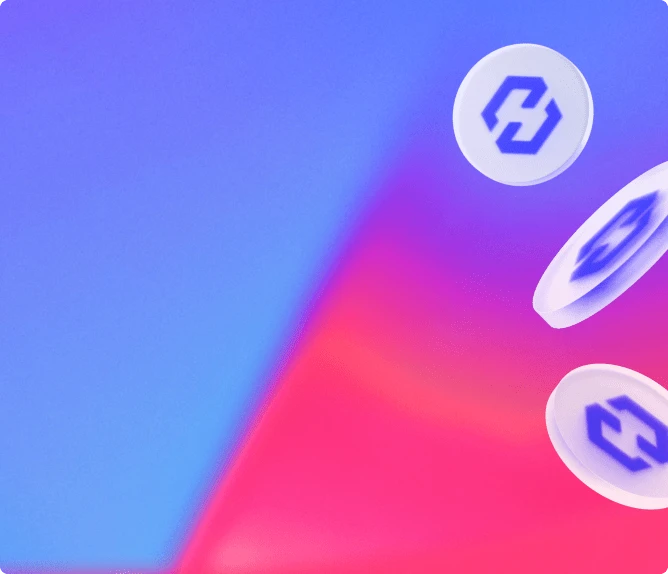Investing in crypto-assets carries risks of liquidity, volatility, and partial or total capital loss. Crypto-assets held are not covered by deposit and securities guarantee mechanisms.


Sign up for our newsletter
Partners
Coinhouse
Our accounts
Coinhouse
Coinhouse SAS with a capital of €210,000, RCS Paris 815 254 545, headquarters: 14 Avenue de l'Opéra 75001 Paris – support@coinhouse.com. Registered with the AMF for activities related to the purchase/sale of digital assets against legal tender, the exchange of digital assets for other digital assets, and the custody of digital assets for third parties under the registration number: E2020-001.
Coinhouse payment solutions
Company registered with the Paris RCS under the number 914 384 557, registered with the Prudential Control and Resolution Authority as a payment service agent under the number 727503 of the electronic money institution Treezor, headquartered at 33 Avenue de Wagram, 75017 Paris.
General conditions, disclaimers and legal documents.



SushiSwap is a decentralized exchange platform or DEX that was created in 2020.
A DEX allows cryptos to be exchanged peer-to-peer.
This means there is no intermediary.
On a DEX, liquidity is provided directly by users via liquidity pools.
DEXs represent a high-potential area for DeFi.
Although less intuitive to use than CEXs (centralized exchanges or brokers), DEXs are generally less expensive.
Above all, with their liquidity pool system, they fully correspond to the decentralized nature of cryptos.
The DEX market represents a capitalization of €27 billion (as at March 21, 2024).
There are many DEXs on the market today, including Uniswap, dYdX, Synthetix, PancakeSwap (CAKE) and SushiSwap.
Like many other DeFi protocols, it uses a native token, in this case the SUSHI token.
At the time of writing on June 4, 2024, the SUSHI token price is €1.08.
SushiSwap’s capitalization is €283 million, ranking the token 251st worldwide. Buy SUSHI tokens with Coinhouse.
The origins of the Sushi platform are linked to those ofUniswap, which caused a fair amount of controversy at the time.
Uniswap is the largest decentralized exchange on the market, with a capitalization of 6 billion euros.
DEX runs on Ethereum, and its native token is UNI.
The creation of Sushi was born of the desire toimprove Uniswap.
In 2020, a fork occurred on Uniswap.
This means that developers modified Uniswap’s open source code to create a new exchange, SushiSwap!
The two main people behind SuhiSwap are known only by their pseudonyms: Chef Nomi and 0xMaki.
SushiSwap borrows its foundations from Uniswap.
But the split didn’t go smoothly.
The new DEX sought to attract Uniswap customers to its platform.
To this end, the SushiSwap team offered substantial rewards to Uniswap users who wished to migrate their tokens to the new DEX.
As a result, the fledgling DEX was able to quickly build up a large user base and significant cash flow.
In a single week, SushiSwap managed to siphon off over a billion dollars in liquidity, and its TVL reached $150 million.
Between September 10 and 18, SushiSwap’s TVL even exceeded that of Uniswap!
While some call it an aggressive strategy, others see it as a “Vampire attack” on Uniswap.
After a thunderous start, SushiSwap hit a rough patch after just a few days.
Following a $14 million cash withdrawal by Chef Nomi, the SUSHI share price plummeted by 80%.
Under pressure, Chef Nomi stepped down as CEO of SushiSwap and returned the funds to the community.
It was then that a now infamous figure from the cryptosphere entered the SushiSwap story: Sam Bankman-Fried (SBF), ex-CEO of (the former) exchange FTX.
On leaving his post, Chef Nomi handed over control of SushiSwap to SBF in order to re-establish the helm.
The FTX exchange then listed the SUSHI token.
To repatriate new liquidity, SBF successfully launched a new phase of “vampirization” of Uniswap.
He then returned control of the platform to the community, inviting them to choose 9 users who would participate (in addition to him) in the governance of the protocol.
With the situation restored, Sam Bankman-Fried handed over the running of SushiSwap to 0xMaki, the other DEX founder.
For the SushiSwap community, SBF has long been perceived as the “saviour of Sushi”.
Currently, the firm’s CEO in charge of SushiSwap development is Jared Grey.
SushiSwap enablestokens to be exchanged (swapped) in a decentralized way.
Since it operates on the Ethereum blockchain, SushiSwap is limited to the exchange of ERC-20 tokens.
For tokens or cryptos belonging to a blockchain other than Ethereum, you can exchange their Wrapped version.
For example, on SushiSwap, you can exchange your SUSHI for “wrapped” Bitcoins(WBTC).
On SushiSwap, you can also buy certain cryptos directly with fiat money.
Cash is provided directly by users.
To participate in these pools and become a liquidity provider, users simply “lend” tokens to the SushiSwap protocol.
In return for their contribution, users receive a reward.
When a user exchanges a token on SushiSwap, he or she buys it from the corresponding liquidity pool, which is rigged by other users.
On a centralized exchange, the user buys the token from the company with crypto equity.
This is why platforms like SushiSwap are referred to as decentralized exchanges.
Another difference with CEXs concerns the way trading is done.
SushiSwap doesn’t use the order-book technique favored by centralized platforms.
SushiSwap is an AMM like Uniswap.
An AMM is an automatic market maker.
When two assets are exchanged with each other, the relative prices of these two corners evolve and a new market rate is determined via algorithms.
Finally, as a DEX, Sushiswap is a “permissionless” exchange, meaning that anyone can use its services.
Unlike a centralized platform, there’s no need to register and go through various stages of identity verification on SushiSwap.
Since the exchange is peer-to-peer, no central entity can intervene to suspend, modify or cancel a transaction. Live SUSHI lessons.
DEX works with liquidity pools.
By owning SUSHI tokens, you can participate in these liquidity pools by becoming an LP (Liquidity Provider).
To buy SUSHI tokens, you can use the services of an exchange such as Coinhouse.
You can then use these tokens directly on the SUSHI platform.
The SUSHI token cannot be mined, but it is possible to stake it via the Sushi Bar.
Staking SUSHI tokens earns you xSUSHI, which in turn earns you rewards.
On SushiSwap, xSUSHI holders earn 0.05% on the standard 0.3% transaction fee.
To stake SUSHI, simply go to the SUSHI homepage and click on “Stake” at the top of the page.
Next, you’ll need to indicate how many SUSHI tokens you’d like to stake.
For example, 1,000 SUSHI entitles you to more than 733 xSUSHI.
The “exchange rate” between SUSHI and xSUSHI depends on the price of each token.
The value of the xSUSHI token is based on yield.
It increases with the number of transactions, since 0.05% of the fee goes to staking.
As xSUSHI increases in value over time, you’ll earn more SUSHI when you convert them out of staking.
All that’s left to do is connect your crypto wallet and validate your transaction.
SUSHI is similar to the UNI token on Uniswap.
Like UNI, SUSHI is an ERC-20 token that runs on Ethereum and acts as a native token.
SUSHI enables you to use the services of the decentralized exchange.
By owning SUSHI, you have access to a wide range of services, liquidity pools and can become a liquidity provider (see below).
SUSHI holders are rewarded with a fraction of the transaction fees.
One of the great benefits of SUSHI is its governance.
Unlike Uniswap, SushiSwap operates on a DAO basis.
By holding SUSHI tokens, you can participate in votes and submit proposals concerning the DeFi protocol.
Governance is via a Snapshot voting platform.
On this platform, you’ll find all the proposals submitted by the community.
Voting is not done directly in SUSHI, but uses an intermediate unit called SUSHIPOWAH which is defined as follows:
To bring a proposal to the voting stage, a minimum quorum of 5 million SUSHIPOWAH is required.
To be eligible to vote, you must first own SUSHIPOWAH.
This means that you can’t rush to buy SUSHI tokens to transform them into SUSHIPOWAH and influence an existing vote.
By comparison, Uniswap distributed only 60% of tokens to the community, 21.5% to the team and 17.8% to investors.
SushiSwap is therefore more community-oriented.
The number of SUSHI tokens is limited to 250 million.
At present, there are 236,111,829 tokens in circulation.
This number evolves according to the “block rate”, i.e. the rate of SUSHI distributed when each block is validated.
For the first 100,000 blocks, the block rate was 1,000 SUSHI.
This enabled a very large number of tokens to be put into circulation.
By November 2021, 50% of the total SUSHI supply was already in circulation (127 million).
The block rate was then reduced to 1,000 SUSHI.
TECHNICAL DATA
| Compatible wallets | Ledger Nano S, Ledger Nano X, Trezor, MetaMask, WalletConnect |
|---|---|
| TVL | 370 million dollars |
| Pair of cryptos available | 180 |
| Capitalization | 350 million euros |
| Transaction volume | 25 million euros |
| Security | Regular audits by Quantstamp and Consensys Diligence |
| Fees | 0.3% with :
|
SushiSwap is an important DeFi (decentralized finance) protocol .
The platform mainly enables peer-to-peer exchange of tokens.
SushiSwap is therefore positioned on the decentralized exchange of assets in opposition to the centralized exchange made by CEXs.
DEXs are enjoying renewed interest following the numerous scandals involving CEXs in recent years.
SushiSwap is therefore in a buoyant sector, making SUSHI a token with great potential.
SushiSwap enters the DEX category, which already boasts numerous other players such as Uniswap, dYdX and PancakeSwap.
Competition is therefore fierce.
After a controversial start, SushiSwap has settled into the DEX landscape.
For the time being, however, it has to be said that SushiSwap is not yet up to the level of some of its competitors.
While Uniswap (UNI) is the undisputed leader among decentralized exchanges, Synthetix (SNX), dYdX (DYDX) and PancakeSwap (CAKE) are DEXs with much larger market capitalizations than SushiSwap.
Nevertheless, SushiSwap has a number of strengths that could set it apart in the years to come.
For example, the platform stands out for its community-focused policy , as demonstrated by its DAO and the allocation of its tokens.
What’s more, SushiSwap offers services other than the simple decentralized exchange of ERC-20 tokens.
On SushiSwap, you canbuy cryptos directly in euros oraccess various DeFi products such as Farming, Lending and Borrowing.
What’s more, you can earn passive income by becoming a liquidity provider or by staking.
As with any investment, you need to exercise caution.
Buying SushiSwap involves risks, not least because crypto prices are highly volatile.
We therefore recommend that you read up on the SUSHI protocol before investing your money with full knowledge of the facts.
Share the article


Download app